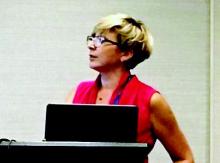SAN FRANCISCO – Whole body cryotherapy led to significant improvements in memory and significant but less durable reductions in depressive symptoms among older patients with mild cognitive impairment in a small, uncontrolled trial.
“We cannot call whole body cryotherapy a treatment yet, but we have some good preliminary results suggesting that this might be a natural method of treating memory impairment,” Joanna Rymaszewska, MD, PhD, of Wroclaw (Poland) Medical University said during an oral presentation at the at the 2016 congress of the International Psychogeriatric Association. Based on this and other work, whole body cryotherapy also might ease depression if patients were able to undergo regular long-term treatment, she said.
Very low temperatures have antioxidant and anti-inflammatory effects, which originally sparked the idea that cryotherapy might help prevent dementia, Dr. Rymaszewska said. To test that hypothesis, she and her colleagues exposed 21 patients with mild cognitive impairment (average baseline Montreal Cognitive Assessment (MoCA) score, 23.8; range, 20-26) to whole body cryotherapy for 2 minutes a day for 10 days, excluding weekends. Patients donned swimsuits, socks, gloves, and mouth covers to facilitate breathing and then walked in pairs around a chamber cooled to between –110° C and –160° C (–166° F to –256° F). “The temperature is so low that you actually cannot feel it,” Dr. Rymaszewska said. The group averaged 65 years of age, and two-thirds were women.
Immediately after the final cryotherapy session and 2 weeks later, patients had improved significantly (P less than .05) from baseline on two-word recall subscales of the DemTect, a psychometric screening tool; on the semantic and anterograde subscales of the 5-minute Test Your Memory (TYM) scale; and on the logical memory subscale of the Saint Louis University Mental Status (SLUMS) exam, Dr. Rymaszewska said.
Enzyme-linked immunoassays showed no significant changes in plasma levels of brain-derived neurotrophic factor or in the cytokines interleukin-6, IL-8, or IL-10 before and after cryotherapy, Dr. Rymaszewska said. But after treatment, patients produced significantly more brain-derived neurotrophic factor and significantly less IL-6 and IL-10 and in response to amyloid-beta, she added. “These preliminary results show a positive influence of whole body cryostimulation on mnestic processes in people with mild cognitive impairment, but the biological mechanisms need further investigation,” she concluded.
Patients also improved significantly on the short form,15-item Geriatric Depression Scale (GDS-15) immediately after finishing cryotherapy. However, the effect was less durable, having lost statistical significance 2 weeks later, Dr. Rymaszewska said. However, parallel studies of the effects of whole body cryotherapy on mood and depression are showing early positive results, she said.
Cryotherapy is so well known in Poland that it would not have been possible to blind a control group to a less-cold “placebo” intervention, Dr. Rymaszewska noted.
The Ministry of Science and Higher Education in Poland helped fund the research. Dr. Rymaszewska had no disclosures.


